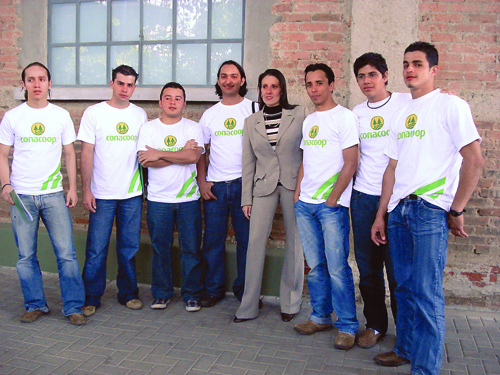Long considered one of the region’s most stable democracies, Costa Rica is beginning to show signs of strain. Nowhere is this felt more sharply than among the country’s youth. According to a 2007 survey of Costa Ricans between the ages of 15 and 35, just 50 percent of respondents said they believed democracy was the best political system and 60 percent said they lacked confidence in Costa Rica’s “governing officials.”
Winning back these disenchanted youth is one of the primary challenges of Karina Bolaños, Costa Rica’s Vice Minister of Youth. The ministry that Bolaños, 36, helps direct conducted the survey of Costa Rican youth, and the public attention to its worrying figures is spurring government action in areas such as HIV/AIDS education and microfinance for young entrepreneurs.
For Bolaños, politics is a family affair. Her father was the mayor in her hometown of Heredia, and her husband is running for the Chamber of Deputies in the same local district. In 2005, she jumped into national politics, working on the campaign of Oscar Arias, directing youth mobilization campaigns.
After Arias’ election, Bolaños joined the ministry, where she has developed a pragmatic approach to tackling the issues faced by young Costa Ricans.
For example, Bolaños, who describes herself as “100 percent Catholic,” has pioneered her country’s HIV/AIDS prevention programs. The ministry, at her urging, has begun a United Nations-supported program aimed at training young people in AIDS prevention, which inevitably has involved training in condom use and sex education. The program has been criticized by several local priests, but the ever-practical Bolaños maintains that programs must respond to the reality of sexual activity among youth, without preaching to them.
One of Bolaños’ crowning achievements was helping to secure
In June, the Ministry of Youth launched a joint project with the Ministry of Labor to provide loans to young entrepreneurs. Even before the program had gotten off the ground, more than 1,000 applications poured in from aspiring businessmen and businesswomen around the country. Bolaños won’t say whether she has future political ambitions, but she acknowledges her stint in the youth ministry won’t last forever. “You have to open the door for the next generation,” she says. One of those rising youth leaders may be close to home. Her 11-year-old daughter, Daniela, lost a recent bid to become class president—but plans to run again.





